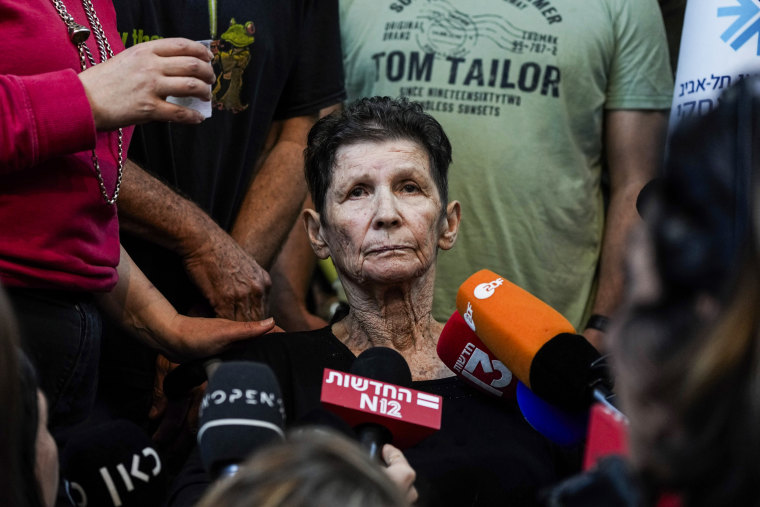As negotiators neared a ceasefire agreement between Israel and Hamas on Tuesday, the families of hostages held for 15 agonizing months in the Gaza Strip said that they “remain hopeful” that their loved ones will be released.
Still, Israeli Prime Minister Benjamin Netanyahu was facing political backlash Tuesday even before a potential truce with Hamas had been inked.
Negotiators were expected to meet in Qatar on Tuesday to finalize details of a ceasefire, the day after President Joe Biden indicated the deal was “on the brink of coming to fruition.” That apparent breakthrough came after more than a year of war that has devastated Gaza and a year of stop-start talks.
For those whose loved ones have remained in captivity through a succession of false dawns, a deal can’t come soon enough.
After months of fiercely criticizing Israel’s government and leading mass protests, the Hostages and Missing Families Forum — an advocacy group that represents many of the hostages’ families — said in a statement that “any deal, even a limited one, represents an important first step toward a comprehensive agreement.”
They added that they remained “hopeful that each step brings us closer to bringing everyone home.”
Of the 251 hostages kidnapped by Hamas on Oct. 7, 2023, 94 people are still being held in Gaza — 34 of whom have died. Four other hostages in Gaza predate Oct. 7, and two of them have also died.
Daniel Lifshitz, 36, whose 84-year-old grandfather was taken from Kibbutz Nir Oz in southern Israel, told NBC News on Monday that he was “optimistic” about the deal but felt like he was on a “roller coaster.”
Lifshitz, whose 85-year-old grandmother Yocheved Lifshitz was freed in October 2023, said President-elect Donald Trump’s tough language had helped to make the negotiations easier for mediators.
“I think now both sides need to prove that they are going to do what Trump said. I trust it,” he said.

Netanyahu, who has been the focus of many of the hostage families’ protests, invited family representatives for a meeting Tuesday in conjunction with the hostage deal, a spokesperson for the organization told NBC News on Monday.
He is yet to comment on the negotiations or the contents of a potential deal.
The White House has been pushing both sides to reach an agreement, and two U.S. officials close to the negotiations told NBC News on Monday that, under the current proposal, the first hostages held by Hamas would be released 48 hours after the ceasefire is announced and in place.
One of the officials said the first set of hostages set to be released under the proposed deal are “in very bad shape.” The release of the rest of the hostages held in Gaza, including Americans, would eventually follow.
But even as the two sides neared a deal, a large section of a missile fired by Yemen’s Iran-backed Houthi rebels was being cleared by Israeli police after it hit a home in the village of Mevo Beitar, around 10 miles south of Jerusalem.
The proposed ceasefire has been greeted with fury by hard-liners in Netanyahu’s government.
Itamar Ben-Gvir, the far-right police minister, has threatened to resign from the fractious and fragile coalition government.
Ben-Gvir said in a post on X that Netanyahu should “take steps that will lead to the defeat of Hamas and the release of our hostages without abandoning Israel’s security: to completely stop the transfer of humanitarian aid and fuel, electricity and water to Gaza, along with continuing the military crushing of Hamas.”
Ben-Gvir’s fellow ultranationalist, Finance Minister Bezalel Smotrich, has not indicated whether he will resign, but also criticized what he called the “surrender deal.” In a post on X, he said that “this is the time … to occupy and cleanse the entire Strip, to finally take control of humanitarian aid from Hamas.”
And others view the emerging agreement as too little, too late.
Before the apparent breakthrough over the weekend, Aviva Siegel, herself a former hostage who was held in Gaza for 51 days, said she feared the deal was too late “because we know the conditions” the hostages are held in.
“It’s the closest that it’s ever been since I’ve been released,” she told NBC News earlier this month. “This deal has to come true. It just has to come true.”
If it’s successful, the phased ceasefire could halt fighting that began after Hamas led the Oct. 7 terror attacks, in which some 1,200 people were killed and around 250 taken hostage, according to Israeli figures.
More than 46,500 people have been killed in Gaza since Israel launched its offensive in the enclave, according to local health officials, although the death toll is thought to be higher.